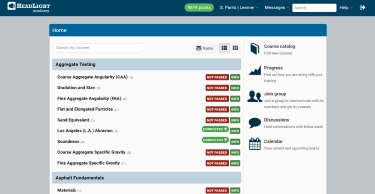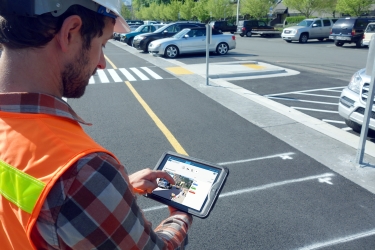|
Subscribe / Renew |
|
|
Contact Us |
|
| ► Subscribe to our Free Weekly Newsletter | |
| home | Welcome, sign in or click here to subscribe. | login |
Construction
| |

May 4, 2017
Need to learn something on the jobsite? Fire up this new app for on-the-fly construction training
Journal Staff Reporter
Seattle-based Pavia Systems said it launched HeadLight Academy to give workers added training online on how to do their jobs on transportation infrastructure construction projects, such as bridges and roads.
Pavia provides technology and training for that industry. HeadLight Academy is a new module of its subscription-based HeadLight Project Intelligence software platform, which also has modules for jobsite/project inspections and payment tracking.
Academy uses 50 pre-built curricula for courses, such as flagging fundamentals, site preparation and planning, rubberized hot-mix asphalt, components of compaction and environmental awareness.
Pavia also will build customized curricula for companies and agencies. For instance, it is creating Academy courses for the state of Maryland about laying down asphalt that address the mix and application methods appropriate for weather conditions in the state, said Steve Parris, director of interactive media for Pavia.
Academy should be used in addition to formal training, he said. “This doesn't necessarily supplant formal training,” Parris said. “It advances it, and it makes it mobile.”
Pavia said that with the construction industry experiencing a wave of retiring workers and an influx of junior personnel, agencies and engineering firms need ways, such as Academy, to supplement formal training to reduce their exposure to jobsite risk.
It said that rather than outsource training, Academy allows firms to select the curriculum they need, determine goals for each program and track how each employee is performing against those benchmarks.
This means less downtime sending staff to off-site educational facilities, and seasoned employees can take quick refresher courses anywhere and access just-in-time information.
Workers access Academy using mobile devices or desktop computers. The company said Academy acts as a virtual mentor, with interactive resources ranging from a few minutes to an hour of classroom equivalent training, incorporating video, simulations, animation and interactive elements.
Troubleshooting sections anticipate commonly asked questions, Parris said, and the interactive part might mean, for instance, identifying an auger in a paving machine by clicking on it.
Workers can earn badges to incentivize learning as they progress through the courses, “and some of our organizations watch that very carefully,” Parris said.
Upon completion of each course, users are asked questions to evaluate their understanding of the material.
Parris said younger workers generally are more accustomed to e-learning. “I think it is fair to say this kind of learning will really appeal to digital natives, and we are anticipating that these will be the workers of the future,” he said.
But some workers do not have that experience, and need Pavia to show them how to use an iPad or web browser and how to send an email or find a cell signal, he said.
Suzanne Garner, Pavia's director of marketing, said for a number of workers the infrastructure construction industry is a second career.
Pavia was established in 2005, and is the first company to spin out of the University of Washington Civil and Environmental Engineering Department.
Si Katara, president and co-founder of Pavia Systems, said the privately held company is in growth mode, but is not yet profitable. He declined to release revenues.
The company said its HeadLight Project Intelligence software platform helps clients accelerate delivery, reduce risk and increase accountability on construction projects by streamlining and mobilizing project inspections, communications and documentation.
The platform has been used on more than $10 billion worth of transportation construction projects nationwide, it said. Customers include departments of transportation, engineering firms and contractors.
Garner said among Pavia's clients are engineering firms KPG, Jacobs, TranSystems and Perteet. Government and agency clients include the city of Lacey and the Washington, Louisiana, Alabama, Colorado, Texas, California and Maryland departments of transportation.
Katara said builders in vertical construction have a lot of technology tools available, but the horizontal construction and infrastructure industry does not. This provides opportunity for his firm, he said.
Lynn Porter can be
reached by email or by phone
at (206) 622-8272.
Previous columns:
- UW students help Seattle Children's Theatre as part of the 2017 Green Energy Challenge, 04-27-2017
- AP investigation: Oroville Dam managers made questionable decisions as spillway nearly failed, 04-20-2017
- Industry dispels the ‘college for all' notion with new ways to make construction cool, 04-13-2017
- Larger buildings face mandatory ‘tune-ups' under new efficiency program for Seattle, 04-06-2017
- Oregon woodworker can make anything — from funeral urns to treasure chests to Chinese doors, 03-30-2017
- US Forest Service OKs proposal for more logging and burning to lower risk of wildfires, 03-23-2017
- Old businesses pushed out as industrial areas become trendy hotspots, 03-16-2017
- Mentoring program at Oregon high school pairs wood shop students with fourth-graders, 03-09-2017




